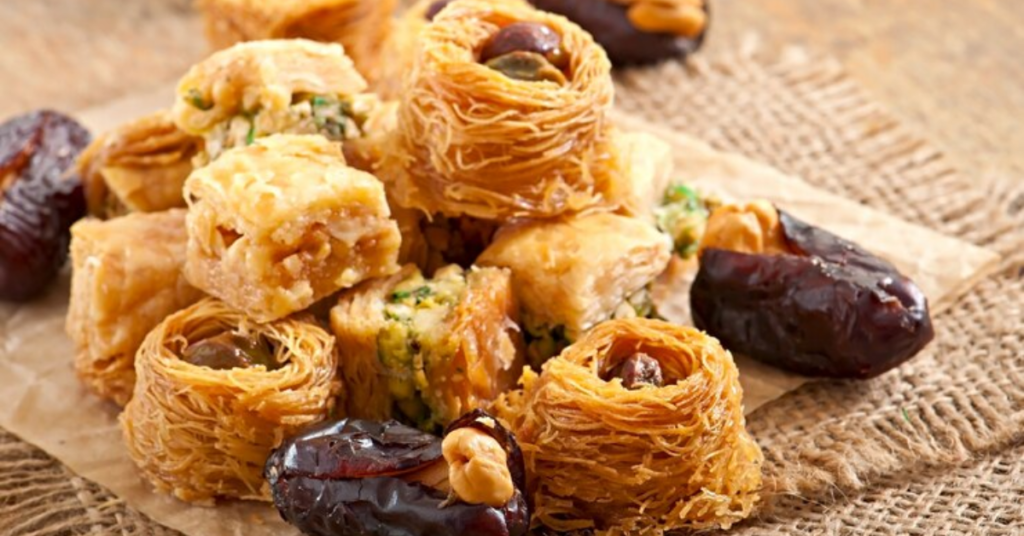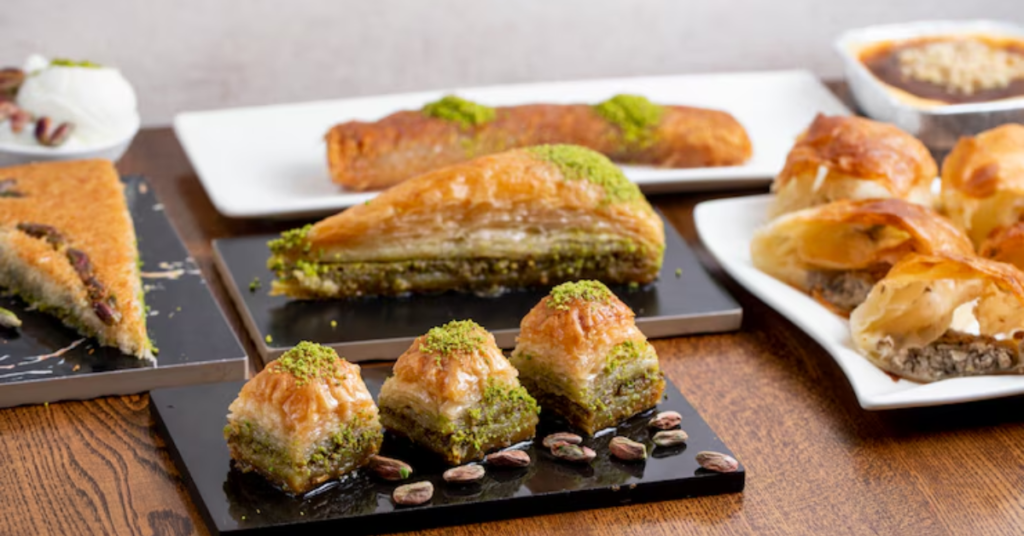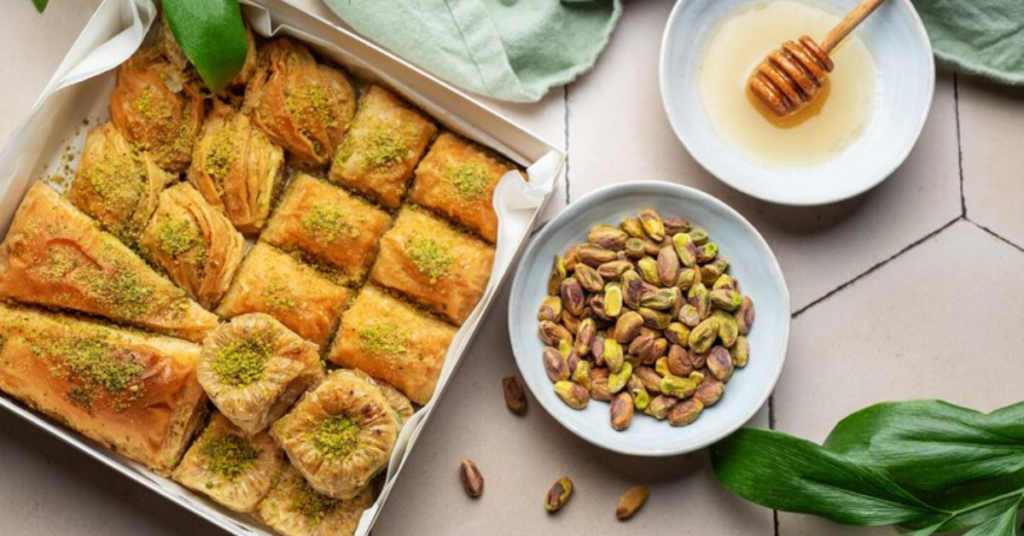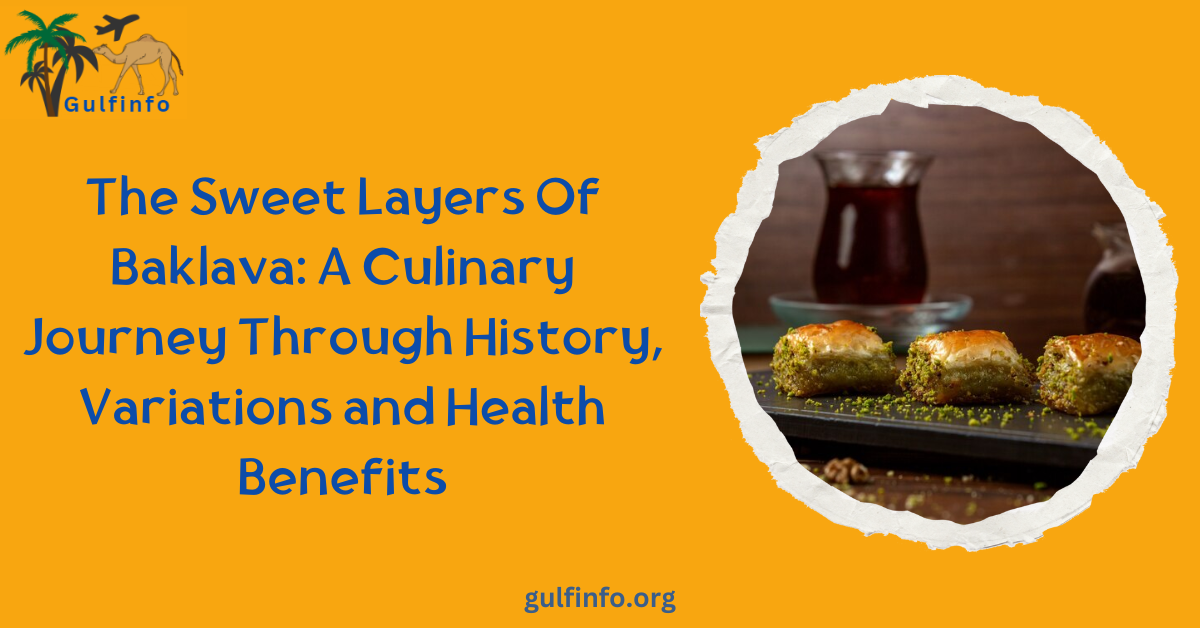Let’s take a journey into the world of Baklava, the layers of crispy pastry filled with sweet honey and crunchy nuts. This dish has been made by people for an ancient time. This blog will tell you all about where it came from, the different kinds you can try and even some surprising ways it’s good for you.
History and Origin

The origins of Baklava is from ancient civilizations of the Middle East, where it was first made as a luxurious treat for royalty and nobility. Over the time of its evolution into the delicious dish that we know today, it has crossed continents and cultural boundaries. From the kitchens of the Ottoman Empire to the lively streets of Turkey and Middle east, Baklava has left an indelible mark on the culinary landscape.
Ingredients and Preparation
Baklava is made with simple and healthy ingredients. Layers of thin pastry are brushed with butter and filled with finely chopped nuts like almonds, walnuts or pistachios. Spices used in Baklava like cinnamon and cloves add flavor. Then, it’s all soaked in a sugar syrup made from honey, sugar, and lemon juice for flavor. Making Baklava takes time and care. Each layer of pastry is carefully placed and brushed with butter for a crispy crust. The filling is spread evenly for a tasty bite every time. Finally, it’s baked until it’s golden and smells amazing.
Regional Variations

Although Baklava originally came from the Middle East, it’s enjoyed worldwide and every place has its own special way of making it. In Turkey, they use pistachios and sweet syrup. In Greece, almonds and walnuts are the key components, which give it a great nutty flavor. In Lebanon, rose water is added to the syrup to enhance its flavor.
Baklava Myths and Legends
Baklava has its share of myths and legends in many tales. Some say it was created in the grand kitchens of the Ottoman Empire to impress main guests. Another story tells of a clever baker who made it to win the heart of a sultan’s daughter. In Greek mythology, Baklava is linked to the story of Phyllis and Demophon which symbolizes love and loyalty. Whatever the story is, Baklava holds a special place in our hearts and imaginations that reminds us of love, devotion and the magic of sweet indulgence.
Health Benefits

Baklava is not just about its delightful taste, it also offers surprising health benefits. Nuts, the star of Baklava, are packed with essential nutrients like heart-healthy fats, protein and fiber. Honey is another vital component, has antibacterial effects and is high in antioxidants that are beneficial for the immune system and general health. Baklava is a delicacy that fulfills both taste and health conscious choice.
Baklava-Making Tips
For those eager to recreate the magic of Baklava in their own kitchen, here are some expert tips to ensure success:
- Use fresh, high-quality ingredients for the best flavor and texture.
- Thaw phyllo pastry according to package instructions and handle it gently to prevent tearing.
- Brush each layer of phyllo pastry with melted butter to achieve a crispy, golden crust.
- Experiment with different nut combinations and spices to personalize your Baklava recipe.
- Allow Baklava to cool completely before cutting into squares to prevent crumbling.
FAQ’s
What are the key ingredients in Baklava?
The key ingredients in Baklava are phyllo pastry, nuts (such as almonds, walnuts or pistachios), butter, honey and spices.
How is Baklava made?
Baklava is made by layering phyllo pastry sheets with a mixture of nuts, butter and spices, then baking until golden and soaking it in syrup.
What are the health benefits of Baklava?
Baklava offers health benefits due to its nutritious ingredients like nuts, which are rich in healthy fats and protein and honey, which has antioxidant properties.
What variations of Baklava exist?
Different regions have their own variations, with Turkey favoring pistachios, Greece using almonds and walnuts, and Lebanon adding rose water to the syrup.
Can Baklava be made at home?
Yes, Baklava can be made at home with the right ingredients and recipe, though it requires patience and attention to detail.
Is Baklava suitable for vegetarians?
Yes, Baklava is typically suitable for vegetarians as it does not contain any meat or animal-derived ingredients.
How should Baklava be stored?
Baklava should be stored in an airtight container at room temperature to maintain its freshness and crispiness.
Conclusion
We are reminded of the enduring appeal of Baklava and worldwide attractiveness as we come to an end of our delicious tour through its universe. Baklava continues to enchant palates and hearts all throughout the world, whether it is prepared traditionally or in more modern ways. Enjoyed as a sweet treat or a rich dessert, Baklava encourages us to cherish the diverse range of tastes that bring us all together and to enjoy every moment.

Mohammad Dilshad Nadeem,a competent content writer for Gulf Info,specializes in interesting narrative about the Gulf. His expertise covers politics, society,trends and each article has unique insights. He attracts readers with his ability to tell compelling stories and offers a clear picture of the Gulf’s changing environment.

